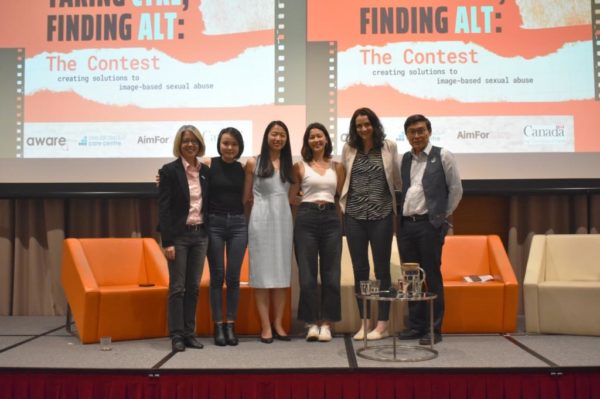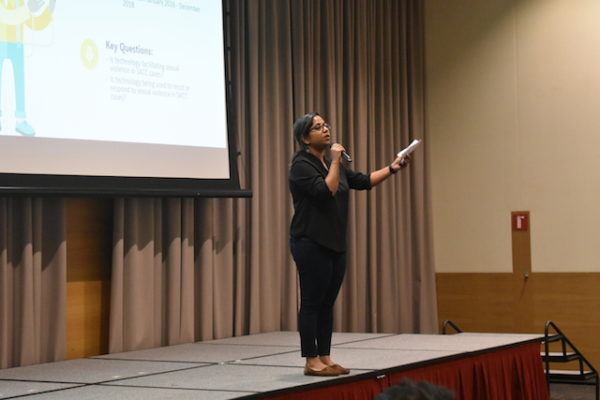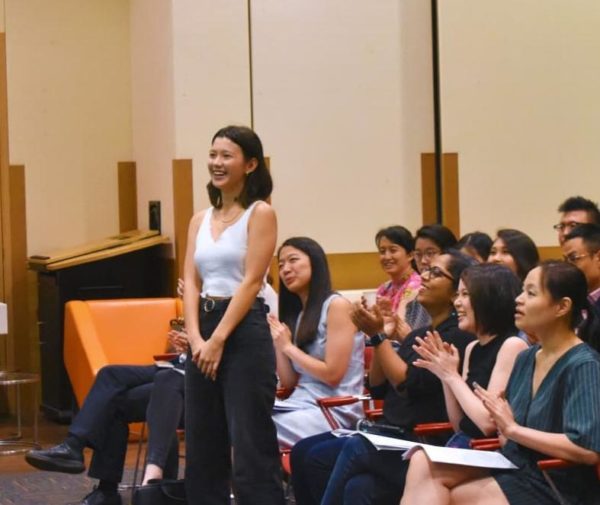-
Advocacy Theme
-
Tags
- Abortion
- Adoption
- Caregiving
- CEDAW
- Disability
- Domestic Violence
- Domestic Workers
- Harassment
- Healthcare
- Housing
- International/Regional Work
- Maintenance
- Media
- Migrant Spouses
- Migrant Workers
- Muslim Law
- National budget
- Parental Leave
- Parenthood
- Polygamy
- Population
- Race and religion
- Sexual Violence
- Sexuality Education
- Single Parents
- Social Support
- Sterilisation
- Women's Charter
A Recap: Taking Ctrl, Finding Alt 2019
November 29th, 2019 | Gender-based Violence, News, TFSV, Workplace Harassment

Written by Jasmine Gomez. Photographs by Kaspen Paraskakis Narayan.
One hundred and twenty-four: That’s is the total number of survivors of technology-facilitated sexual violence who sought help at AWARE’s Sexual Assault Care Centre (SACC) in 2018.
These 124 survivors experienced harassment ranging from unwanted explicit sexual messages and calls to the non-consensual creation, obtainment and distribution of sexual images of themselves.
That number, in fact, has been constantly rising every year. It was 99 in 2017, and 46 in 2016. However, there is a silver lining: the fact that the Singaporean public is waking up to the pervasiveness of the issue of tech-facilitated sexual violence (TFSV), and interested in doing something about it.
On 25 November—in commemoration of the International Day for the Elimination of Violence Against Women, as well as the one-year anniversary of AWARE’s Aim For Zero campaign against sexual violence—around 150 participants made their way to the Lifelong Learning Institute in Paya Lebar, for a multi-part event called Taking Ctrl, Finding Alt 2019. It comprised the public launch of a new set of statistics on the TFSV cases seen by SACC in the past couple of years, followed by a panel on the barriers and challenges faced by survivors of this type of sexual violence, and a launch of a solutions-oriented contest to combat image-based sexual abuse.
The panel constituted four speakers: Monica Baey, an advocate for sexual violence survivors and a recipient of AWARE’s “Woman of Courage” Award at the 2019 AWARE Ball; Amber Hawkes, the Head of Safety Policy, APAC at Facebook; Benny Bong, counsellor and president of the Society Against Family Violence; and Priscilla Chia, litigator and SACC volunteer lawyer. The conversation was moderated by Lim Xiu Xuan, a senior case manager at SACC.
Corinna, AWARE’s executive director, welcomed the participants with an opening speech which brought to light the success of the Aim For Zero campaign and the #MeToo movement in Singapore, and later revealed another cause for celebration: 25 November also marked AWARE’s 34th year of existence in Singapore.

Anisha Joseph, head of SACC, then kick-started the event by presenting the newest statistics on TFSV cases at SACC. Out of the 124 cases in 2018, she explained, more than 50% involved IBSA—i.e. sexual images of the survivor that were nonconsensually shared, obtained and/or created. Anisha summarised her presentation by noting that TFSV is often “folded into” pre-existing practices of violence, such as verbal harassment or voyeurism.
The subsequent panel discussion covered the mental, social and emotional impact of technology-facilitated sexual violence on survivors and the journey that survivors have to go through towards recovering from and/or reporting the crime. It also touched on practical and legal resolutions available to survivors in Singapore, or to bystanders who witness IBSA on social media platforms such as Facebook.
Litigator Priscilla Chia provided an overview of this year’s amendments to the Penal Code and the Protection from Harassment Act. Because sexual violence that occurs in the digital realm is criminalised, survivors are afforded the ability to apply for an expedited Personal Protection Order (PPO) against someone circulating their sexual images and videos without consent online. Additionally, should such images or videos be uploaded on a certain Facebook or Instagram page, for instance, those entities can be a part of the PPO as well. Priscilla also dispelled a few myths with respect to the application process: Namely, she highlighted that there is no need for the engagement of a lawyer to apply for the PPO.
To complement those legal recourse options, Amber Hawkes brought up the policies Facebook has put in place for its users’ safety as well as the reporting process on the platform.
Counsellor Benny Bong then weighed in on the common misconception that perpetrators of sexual violence, whether online or offline, commit their actions because they are suffering from mental illnesses. Many perpetrators have confessed to him, in fact, that they did what they did because they were confident in being able to get away with it.
Finally, Monica Baey enlightened the crowd with her own personal experience as a well-known survivor of on-campus voyeurism last year. She spoke about accepting the fact that she had been violated, receiving support from her friends and family following the incident, reporting it the police and her university, and the messages that poured in from online users after she posted about her experience on her Instagram account.
“I’ve always felt all this time that I always wanted to make a change, and I know a lot of people who feel the same way,” Monica added passionately. “People are afraid that their actions are too insignificant… but it’s about speaking up in general. Every small voice counts for something. Every person who speaks up makes a difference, but it does take a community to make social change”.

After a Q&A segment that sourced questions from both online platform Slido and the floor, Xiu Xuan launched the Taking Ctrl, Finding Alt contest, which AWARE has put on in conjunction with the High Commission of Canada. For this contest, members of the public will submit proposals for projects aimed at preventing or dealing with IBSA.
Those interested can submit their proposals before 8 February next year. Successful applicants will receive funding of up to $6,000 and development support for a pilot phase over six months next year.



